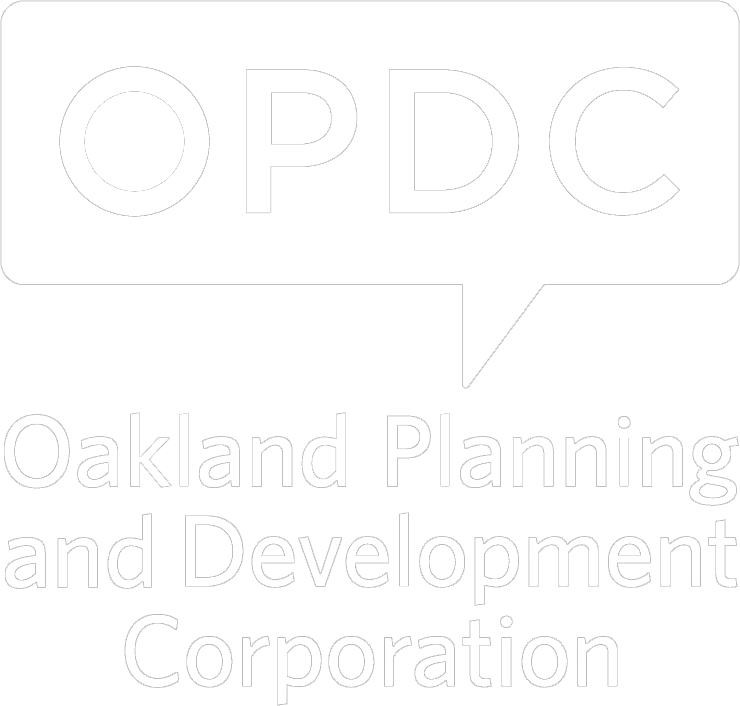By: Sam Gallagher, OPDC Communications Coordinator
Oakland offers many parking options: metered parking near business districts, off-street private lots tucked behind houses and apartment buildings, surface lots for lease-holders, garages large and small, and of course, legendary on-street, bumper-to-bumper parking. No matter how you stow your car in Oakland, there is some amount of stress involved.
The Residential Parking Permit Program (RPPP), a program jointly overseen by The Pittsburgh Parking Authority and the Department of City Planning, was established in 1981. This program was designed to limit on-street parking to residents of that area. For example, if you live in a residential parking permit area, which in Oakland could include regions B, C, D, E, K, M, Q, or FF, you can apply for a yearly permit for $20 per year (a rate that has not changed since the program was first introduced!). With a permit, you can utilize any available on-street parking within your designated letter area. While the program doesn’t guarantee you a spot, it ensures most parked people live nearby. Seems great for Oakland residents, right?
However, while good in theory, the RPPP has many flaws. For starters, the program is not well-enforced and is generally oversubscribed, as there are more permits issued than there are spaces on the street. This oversubscription makes for a competitive on-street market. On top of that, residents also compete to park with visitors who can park for one hour within the district for free.
Earlier this spring, the Department of City Planning invited public comment on the RPPP through an online survey. The results of that survey informed proposed changes to the program, and a public hearing before City Council is scheduled for this Thursday, November 4 at 10:00 a.m.
On Tuesday, October 5, Andrew Dash of the Department of City Planning (DCP) summarized the four big changes that are being proposed, including the transfer of administrative duties, the introduction of hybrid parking, the expansion of visitor permits, and the establishment of a progressive pay structure. Keep reading to learn more about these RPPP changes and what that could mean for Oakland residents:
Transfer of Administrative Duties
The Department of City Planning proposes to transfer duties such as administrative code-changes and RPP Area certification and recertification to the Pittsburgh Parking Authority (PPA), which currently oversees the program. This transfer is intended to streamline communications and reduce confusion. However, the PPA’s RPP program manager position is currently vacant, so this transition might not be entirely seamless.
Hybrid Parking
Hybrid parking is a system by which residents and non-residents can both utilize on-street parking within a designated RPP Area. An RPP area that falls within a half-mile of a hospital or a college or university may opt for hybrid designation, which would allow some residential areas to be metered for commuter use. This system might not make sense for Oakland RPP areas, but any change to existing Oakland areas would involve a public review process to determine its feasibility.
Visitor Permits and Non-Resident Permits
The current visitor policy allows permit holders to register visitors for any three consecutive weekdays. The proposed changes to the visitor permits would still allow visitors to park for three consecutive days but would limit individual visitors to no more than 12 days per month. Under a new provision for non-resident permits, medical caretakers, contractors, childcare professionals, and landlords would be newly eligible for permits within a designated RPP area. Non-residential permits would be available for purchase on a sliding scale, and only with appropriate documentation. Residents of Oakland might have to contend with an increase in the number of permitted on-street parkers, but the expanded program would make it easier for residents with regular at-home caregivers and long-term contractors to accommodate those supports.
Progressive Pay Structure
The last of the big changes is the introduction of a progressive pay structure for the RPPP: Beginning in 2022, households with multiple vehicles could pay more than $20 for their second or third vehicles. This change is not included in the bill currently before City Council.
To read more about the changes to the RPPP, and to see the presentation from the public meeting on October 5, go to: www.engage.pittsburghpa.gov/rpp-program-updates. A recording of the public meeting is also available on the City’s YouTube page.
These updates to the RPP program go before City Council on November 4, 2021. If you wish to provide feedback, you can register to make public comment via the city’s website at www.pittsburghpa.gov/clerk/council-meetings by 9:00 a.m. on the day of the hearing.
